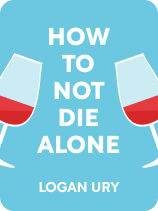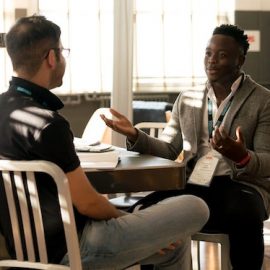

This article is an excerpt from the Shortform book guide to "How to Not Die Alone" by Logan Ury. Shortform has the world's best summaries and analyses of books you should be reading.
Like this article? Sign up for a free trial here.
Are you looking for How to Not Die Alone quotes by Logan Ury? What are some of the most noteworthy passages worth revisiting?
In her book How to Not Die Alone, Logan Ury presents a science-backed approach to finding a life partner. You’ll learn all the ways you could unwittingly be sabotaging your love life and how you can overcome unhealthy dating patterns so that you could do exactly what the title says.
Below is a selection of passages with explanations.
How to Not Die Alone: The Surprising Science That Will Help You Find Love
Logan Ury is a behavioral scientist, dating coach, and Director of Relationship Science at the dating app Hinge. In her book How to Not Die Alone, Ury presents a science-backed approach to finding the true love you’ve always wanted.
The following How to Not Die Alone quotes highlight some of her key ideas.
“Great relationships are created, not discovered.”
Some people believe that their relationship happiness depends on discovering the right person. She calls these people “romanticizers” and explains that approaching dating with this attitude is problematic. Notably, romanticizers tend to envision their ideal soulmate—so when dating, they may overlook great candidates who don’t exactly match this ideal. Additionally, romanticizers believe that finding a good partner guarantees a blissful, problem-free relationship. So, when their relationship inevitably hits a rough patch, they assume they’re with the wrong person and start to look for someone else, beginning the cycle anew.
If you’re a romanticizer, Ury recommends that you shift your attitude and develop a mindset that happy relationships are created, not discovered. With this mindset, you’ll temper your expectations regarding what your soulmate is like and thus grow more open to dating great people who don’t match your ideal. And you’ll realize that all relationships have some issues, so you’ll be willing to work on them when they inevitably arise.
“… couples often make the same big mistake when considering marriage. They’re so fond of each other that they assume the other person wants the same things in life; therefore, they don’t set aside the time to talk explicitly about major decisions like where to live or if they want children.”
Before deciding to marry, Ury recommends sharing both your history and your expectations with your partner. We assume that other people want and believe in the same things we do. But this bias is dangerous. It can lead us to marry people without discussing important topics because we assume they agree with us—then later end up being unpleasantly surprised. For example, you might assume that your partner wants to stay home after you have kids, only to learn that they want you to stay home instead.
Once you’ve determined that your partner is someone who can support you and improve your life long-term, sit down with your partner to discuss these three topics.
Dedicate one night to learning about each other’s history, like how your parents dealt with serious topics or important childhood events. Dedicate a second night to discussing how you are now: Talk about how you could improve the relationship and open up about your current financial situation. Finally, dedicate a third night to discussing your future expectations, like your long-term career goals and how you want to raise your children. Ury explains that it’s OK if your expectations don’t exactly align, as long as you can talk through and have a plan for dealing with them.
“When it comes to relationships, Maximizers—like Steven— mistakenly believe that with the right amount of exploration, they can find the perfect person and have absolute confidence in their decision. But this perfect person (and complete certainty) doesn’t exist. That’s why maximizing leads to anguish, delays in decision-making, and missed opportunities. In other words, it’s better to be a Satisficer.”
Ury explains that if you’re a “Maximizer”, you want to be 100% sure you’ve made the right decision—so you do as much research as possible before choosing anything. Unfortunately, maximizing often leads to unhappiness—mainly because it causes so much stress. You’ll date several people but struggle to commit to someone because you’re worried about missing out on someone better. And even if you do commit, you’ll torture yourself wondering if you made the right decision.
Ury recommends that maximizers learn to “satisfice:” Find and commit to someone who meets your standards, even if they aren’t perfect. Doing so will make you happier for two main reasons: First, you’ll mitigate the stress of maximizing during the selection process because you’ll have clear standards by which to evaluate your choices. Second, by fully committing to your partner, you’ll avoid the stress of wondering whether you made the right choice after you’ve already selected someone because of a neurological phenomenon known as rationalization: If you finalize a decision (like selecting a partner), your brain will convince you that you’ve made the right choice.

———End of Preview———
Like what you just read? Read the rest of the world's best book summary and analysis of Logan Ury's "How to Not Die Alone" at Shortform.
Here's what you'll find in our full How to Not Die Alone summary:
- A science-backed approach for finding the true love you’ve always wanted
- How your patterns may be sabotaging your quest for true love
- How to effectively navigate the twists and turns of a relationship






